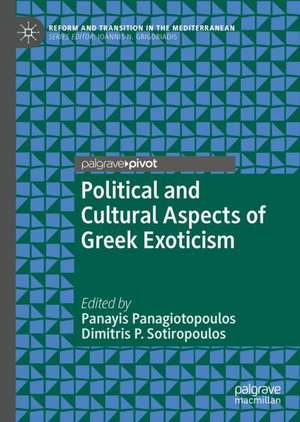Political and Cultural Aspects of Greek Exoticism: Reform and Transition in the Mediterranean
Editat de Panayis Panagiotopoulos, Dimitris P. Sotiropoulosen Limba Engleză Hardback – 23 iul 2019
Preț: 386.22 lei
Nou
Puncte Express: 579
Preț estimativ în valută:
73.90€ • 77.44$ • 61.09£
73.90€ • 77.44$ • 61.09£
Carte tipărită la comandă
Livrare economică 11-25 aprilie
Preluare comenzi: 021 569.72.76
Specificații
ISBN-13: 9783030198633
ISBN-10: 3030198634
Pagini: 144
Ilustrații: XII, 170 p.
Dimensiuni: 148 x 210 mm
Greutate: 0.37 kg
Ediția:1st ed. 2020
Editura: Springer International Publishing
Colecția Palgrave Pivot
Seria Reform and Transition in the Mediterranean
Locul publicării:Cham, Switzerland
ISBN-10: 3030198634
Pagini: 144
Ilustrații: XII, 170 p.
Dimensiuni: 148 x 210 mm
Greutate: 0.37 kg
Ediția:1st ed. 2020
Editura: Springer International Publishing
Colecția Palgrave Pivot
Seria Reform and Transition in the Mediterranean
Locul publicării:Cham, Switzerland
Cuprins
1. Introduction: Framing Greek exoticism. History and the current crisis (Dimitris P. Sotiropoulos, Panayis Panagiotopoulos).- PART I. Exoticism lasts a long time. Philhellenism and other historical constructions of Greece.- 2. Historical Patterns of Greek Exoticism (19th-20th century) (Dimitris P. Sotiropoulos).- 3. The European origins of the Great Idea (Vicky Karafoulidou).- 4. Perceptions of Antiquity and Modernity. Greece in the eyes of her allies, 1946-2018 (Dimitrios Antoniou, Zinovia Lialiouti).- PART II. Radical anticapitalism and social deconstruction during the Greek crisis.- 5. Demodernise Greece. Sociological critique on the construction of an alternative country (Panayis Panagiotopoulos).- 6. Cradle of Solidarity and Philoxenia. Exotic distortions of the Greek migration crisis (Yiorgos Rakkas).- 7. Zorba the Greek. From the “Syrtaki” dance to the Eurogroup (Kostas Karavidas, Yiannis Papatheodorou).- 8. “Spoiled Brats” or “Anti-capitalist Pioneers”. Turkish views of theGreek crisis (Ioannis N. Grigoriadis).- PART III. Ruins and artistic exoticism. Greece as a cultural Arcadia of the West.- 9. Crisis, Exoticism and the Rediscovery of Greece (Dimitris Tziovas).- 10. The Cornucopia of Greekness. Copies and performances of a body that never was (Despina Sevasti).- 11. Self-exoticism, The Iconography of crisis and the Greek Weird Wave (Afroditi Nikolaidou).- 12. Athens, an alternative city. Graffiti and radical tourism (Vassilis Vamvakas).
Notă biografică
Panayis Panagiotopoulos is Assistant Professor of Sociology at the Department of Political Science and Public Administration, National Kapodistrian University of Athens, Greece.Dimitris P. Sotiropoulos is Associate Professor of Contemporary History & Politics at the University of Peloponnese, Greece, and Editor-in-Chief of the Nea Hestia journal.
Textul de pe ultima copertă
This book explores the new Greek exoticism by examining political and cultural mechanisms that contribute to Greece’s image and self-image construction. The contributions shed light on the subject from different perspectives, including political science, history of ideas, sociology, cultural studies, and art criticism. In the first part, the book provides a historical review with a focus on philhellenism, perceptions of antiquity and modernity, and the evolution of Greece as an idea. The second part looks at the current Greek crisis and analyses ideological, political and cultural aspects and stereotypes that contributed to the formation of contemporary Greek culture. The third and final part discusses notions such as aestheticism, idealism and pragmaticism, and deconstructs narrations of Greece through artistic media, such as films and exhibitions, which present a new oriental Utopia.Panayis Panagiotopoulos is Assistant Professor of Sociology at the Department of Political Science and Public Administration, National Kapodistrian University of Athens, Greece.
Dimitris P. Sotiropoulos is Associate Professor of Contemporary History & Politics at the University of Peloponnese, Greece, and Editor-in-Chief of the Nea Hestia journal.
Dimitris P. Sotiropoulos is Associate Professor of Contemporary History & Politics at the University of Peloponnese, Greece, and Editor-in-Chief of the Nea Hestia journal.
Caracteristici
Develops historical, political, cultural and psychoanalytic aspects of the Greek exoticism Explores Greece’s national identity in the context of the financial crisis Contributes to the comprehension of the crisis-ridden society and politics of EU member states












